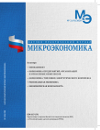It’s Time to Think about Using Expert Networks in Russian Public Administration
DOI: 10.33917/es-6.198.2024.90-97
A special feature of the use of expert networks in public administration is the need to involve collective intelligence technologies based on a competence-based approach. The article proposes a scheme for organizing such use of expert communities with the help of national, sectoral and departmental competency frameworks. Introduction of expert networks in public administration can become a driver for their implementation in all spheres of the economy and public life of Russia, a tool for involving citizens in self-government.
References:
1. The Yankee Group. Knowledge Management. People and the Process. Boston, 1997, 89 p.
2. Friberg M. Expert network market size. Inex One, 2024, available at: https://inex.one/blog/expert-network-market-size
3. Slavin B. Sovremennye ekspertnye seti [Modern Expert Networks]. Otkrytye sistemy, 2014, no 7, pp. 30–33.
4. Noveck B.S. Wiki Government: How Technology Can Make Government Better, Democracy Stronger, and Citizens More Powerful. Washington DC, Brookings Institution Press, 2009, 224 p.
5. Dutton W.H. Networking Distributed Public Expertise: Strategies for Citizen Sourcing Advice to Government. Washington D.C., One of a Series of Occasional Papers in Science and Technology Policy, Science and Technology Policy Institute, Institute for Defense Analyses, 2010. 40 p.
6. EonD top talent accross policy lifecycle. EonD, available at: https://eond.eu/for-clients/government/
7. The OECD Network of Behavioural Insights Experts in Government. The OECD Observatory of Public Sector Innovation, 2024, available at: https://oecd-opsi.org/bi-network/
8. Australian Government Consulting. AGC, available at: https://agc.gov.au/
9. Perechen’ ekspertnykh sovetov pri FAS Rossii [List of Expert Councils under the FAS Russia]. FAS Rossii, available at: https://fas.gov.ru/pages/vazhnayainformacziya/otkryitoe-vedomstvo/ekspertnye_sovety
10. Federal’nyy reestr ekspertov nauchno-tekhnicheskoy sfery [Federal Register of Experts in the Scientific and Technical Sphere]. FGBNU NII RINKTsE, available at: https://reestr.extech.ru/experty/index.php
11. Slavin B.B. Tekhnologii kollektivnogo intellekta [Collective Intelligence Technologies]. Problemy upravleniya, 2016, no 5, pp. 2–9.
12. Boucher S., Hallin C.A., Paulson L., editors. The Routledge Handbook of Collective Intelligence for Democracy and Governance. Abingdon, Taylor & Francis Group, 2023, 522 p.
13. Lepskiy V.E. Metodologicheskiy i filosofskiy analiz razvitiya problematiki upravleniya [Methodological and Philosophical Analysis of the Development of Management Issues]. Moscow, Kogito-Tsentr, 2019, 340 p.
14. Sungurov A. Ekcpertnye soobshchestva i vlast’ [Expert Communities and Authorities]. Moscow, Politicheskaya entsiklopediya, 2020, 231 p.
15. Avdeeva Z.K., Baryshnikov P.Yu., Slavin B.B. Strategicheskoe tselepolaganie v situatsionnykh tsentrakh razvitiya [Strategic Goal Setting in Situational Development Centers]. Moscow, Kogito-Tsentr, 2018, 320 p.







